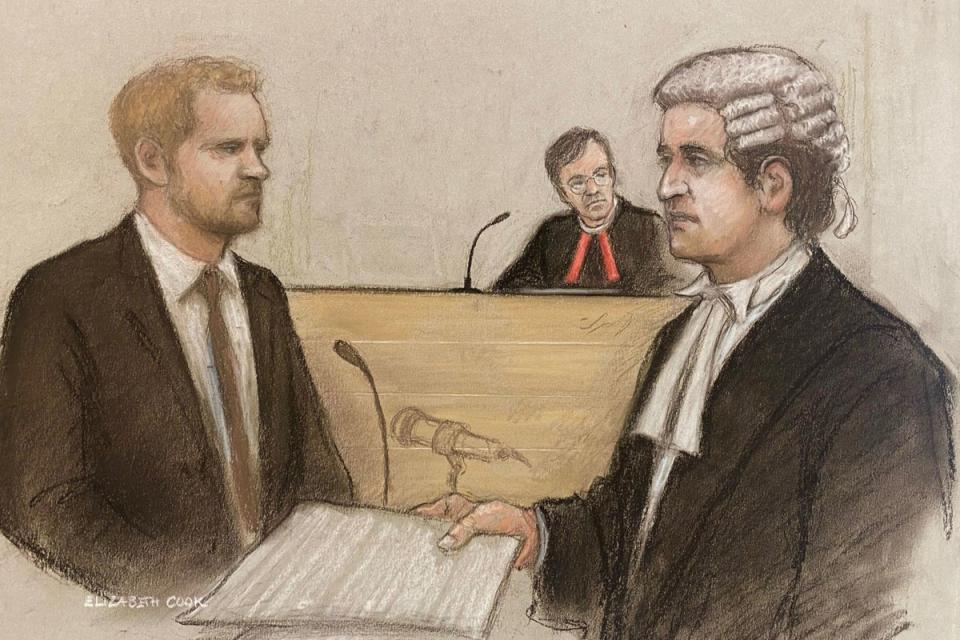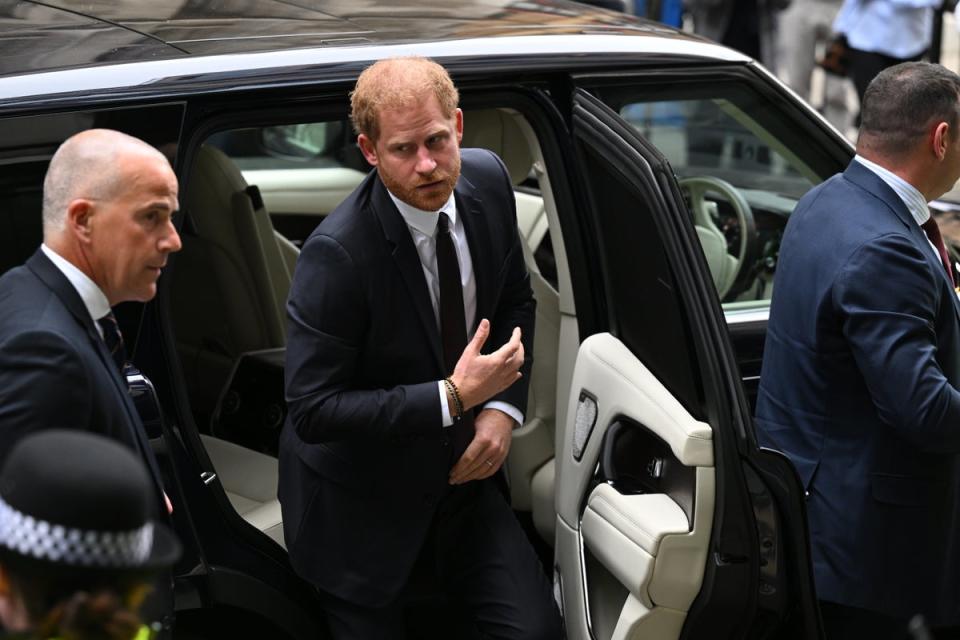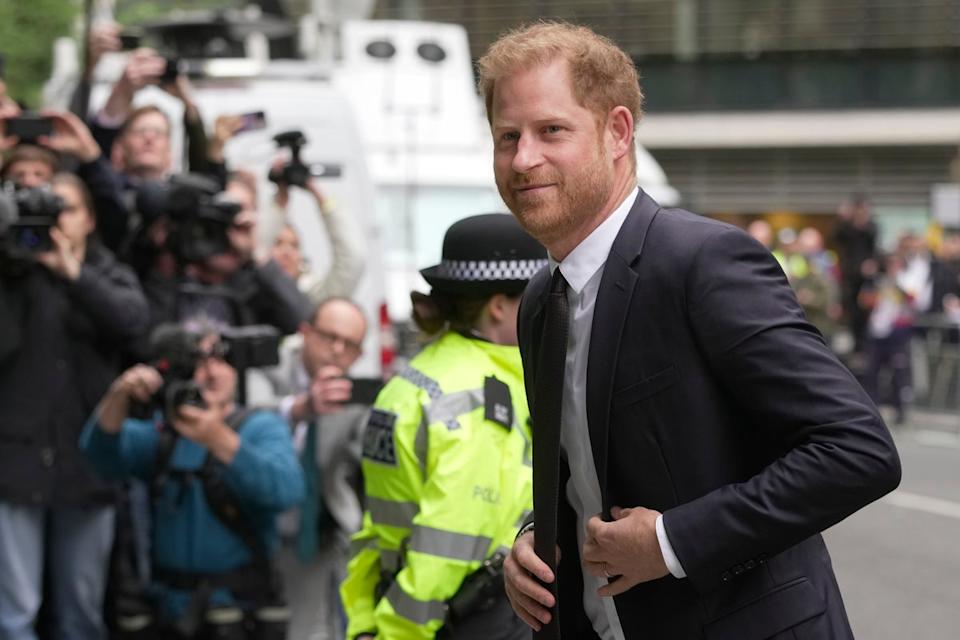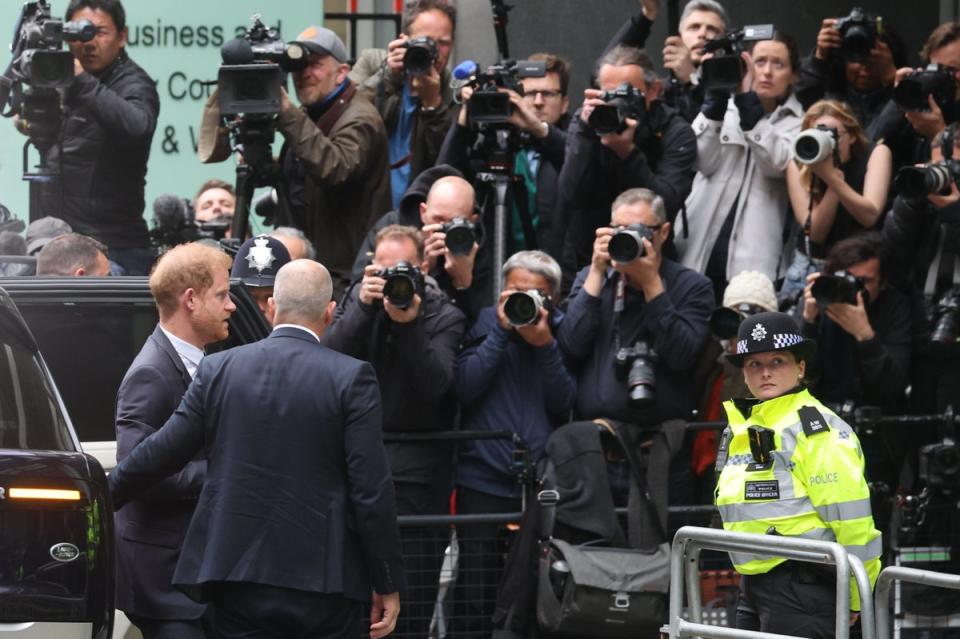Prince Harry accuses newspapers of having ‘blood on their hands’ as he starts phone hacking evidence
Prince Harry accused journalists and editors of having “blood on their hands” and took aim at the “rock bottom” government during his landmark High Court evidence in his privacy battle against a tabloid publisher.
The Duke of Sussex, 38, is suing Mirror Group Newspapers (MGN) over claims that his phone was systematically hacked and he was subjected to media intrusion and unlawful newsgathering techniques for more than 15 years.
He says the activities of three newspapers, the Daily Mirror, Sunday Mirror and The People, wrecked friendships and romantic relationships, and sent him into a spiral of depression.
Harry says he decided to pursue his legal claim against MGN to a High Court showdown “to hold people to account for what they have done, so that they can’t hide behind their own institution or organisation”.
Accusing the publisher of a “cover-up” over phone hacking and widespread unlawful activities, Harry called tabloid newspapers the “mothership of online trolling”.
“Trolls react and mobilise to stories they create”, he said.
“People have died as a result, and people will continue to kill themselves by suicide when they can’t see any other way out.
“How much more blood will stain their typing fingers before someone can put a stop to this madness.”

Asked in court to clarify the statement, Harry said he was referring to “journalists and editors” responsible for stories that are printed.
“Some of the editors and journalists that are responsible for causing a lot of pain, upset and in some cases, speaking personally, death”, he added.
Harry says he and many others have been “targets” for the tabloid press, and it is part of his mission to “save” journalism as a profession.
“I feel that I need to make sure that this unlawful behaviour is exposed, because obviously I don’t want anybody else going through the same thing that I’ve been going through on a personal level.
“But also, on a national level as, at the moment, our country is judged globally by the state of our press and our government – both of which I believe are at rock bottom.
“Democracy fails when your press fails to scrutinise and hold the government accountable, and instead choose to get into bed with them so they can ensure the status quo.
“I may not have a role within the Institution but, as a member of the British Royal family, and as a soldier upholding important values, I feel there’s a responsibility to expose this criminal activity in the name of public interest.
“The country and the British public deserve to know the depths of what was actually happening then, and indeed now. We will be better off for it.”
Harry was softly-spoken as he swore an oath on the bible at the start of his evidence, before his barrister David Sherborne clarified how he should be referred to.
“There’s a protocol that has to be observed”, he said. “The first time you are addressed has to be ‘Your Royal Highness’, and as a matter of personal preference you would rather be called ‘Prince Harry’.
MGN’s barrister Andrew Green KC offered the publisher’s apology over one incident of unlawful newsgathering from 2004, which it has already admitted.
He said if the judge finds more widespread unlawful activity he “will be entitled to and will receive a more extensive apology”.
Mr Green acknowledged Harry has endured “a lifetime of press intrusion”, before questioning the Duke on how he could have been “distressed” by stories that he had not read.
Harry said newspapers were always on display around the Royal Palaces, and he would notice changes in friends and associates after a story appeared.
“Their behaviour inevitably changed around me, and I was told about the articles”, he said.
Questioned on one article about his mother, Harry said it changed “her reaction to me as her son”.
He said he has “experienced hostility from the press since I was born”, and he set out the impact in his witness statement: “Every time I was getting off a plane or jumping in a car, I was looking in the rear-view mirror so to speak. I came to expect to be followed and papped by someone hiding in a bush somewhere. Everything felt as though I was under 24-hour surveillance,.”
The Duke described an incident on a trip to Australia in his gap year in 2003, when the late-Queen secretly sent one of her aides to stay nearby without him knowing in case he needed support because of press coverage.
“I only learnt recently that the Queen had asked one of her assistant private secretaries to fly out to Noosa and take a house down the road from where I was staying, without me knowing,” Harry said.
“She was concerned about the extent of the coverage of my trip and wanted someone I knew to be nearby, in case I needed support.”
The Duke of Sussex, 38, was flanked by a security detail and one of his lawyers as he pulled up in a chauffeur-driven black car and walked past banks of photographers, TV cameras, and curious members of the public outside the Rolls Building of the High Court.
His appearance at court to be questioned at length over his private life is a landmark moment in British legal history.
MGN denies allegations that Harry was a victim of phone hacking, saying there is no call data or first-hand evidence to back up the claim. It has admitted just one incident of a private investigator for the newspaper unlawfully targeting the Duke.

Tuesday is a landmark moment, as Harry becomes the first senior Royal in modern times to voluntarily enter the witness box at the High Court.
The case against MGN is part of a deeply personal crusade against sections of the British media, who he accuses of relentlessly invading his privacy during his youth and early adult life.
Harry’s appearance follows a debacle on Monday - the first day of his individual case against MGN - when the Prince was missing from court.
Trial judge Mr Justice Fancourt had told Harry to attend on Monday, to be ready to start his evidence once opening speeches from lawyers had concluded, and said he was “a little surprised” to learn the Duke was not present, having attended his daughter Princess Lilibet’s birthday party in LA the previous day.
A different witness had to be called in to fill the court time, delaying Harry’s evidence until 10.30am on Tuesday.
Opening Harry’s case on Monday, his barrister David Sherborne insisted the Prince does not have a “vendetta” against the tabloid media, but has pursued this and other legal cases to “focus attention” on unlawful activities by journalists.

Among the stories alleged to be the product of unlawful activities are a report of Harry suffering a back injury while playing rugby at school, strained relations with his brother Prince William over their mother’s former butler Paul Burrell, and revelations of Harry’s activities in nightclubs as a young man.
It is said MGN journalists used a variety of unlawful methods, including ‘blagging’ personal information, to spin a “web around the Prince in the hope they would catch the valuable information they sought”.
His friends and associates were allegedly targeted, while his romance with first love Chelsy Davy was put under immense strain as the media scrambled to name her and reveal personal details about the couple’s life together.
“Had she not been in a relationship with me, she would never have had to endure such a horrific experience at the hands of MGN’s journalists”, said Harry.
“There are even eight private investigator payments made in relation to my mother, which I have only learnt of since bringing my claim. This makes me feel physically sick.”

Mr Sherborne also showed the court letters sent by Harry’s late mother Princess Diana to TV presenter Michael Barrymore, claiming they provided supporting evidence of phone hacking.
MGN reporters revealed that Barrymore had struck up a secret friendship with the Princess during his struggles with coming out as gay and his battle with drug addiction.
In a final letter to Barrymore, two months before her death, Diana’s words suggested he had cut off contact after details of their relationship hit the press.
MGN’s lawyers say allegations that phone hacking was involved is “pure speculation”.
But Harry insisted live phone-tapping must have been deployed to obtain the story: “The thought of Piers Morgan and his band of journalists earwigging into my mother’s private and sensitive messages (in the same way as they have me) and then having given her a ‘nightmare time’ three months prior to her death in Paris, makes me feel physically sick and even more determined to hold those responsible, including Mr Morgan, accountable for their vile and entirely unjustified behaviour.”
Harry now faces questions about deeply personal aspects of his life, including his decision to don a Nazi uniform to a fancy dress party, drug-taking in his youth, and feuding with his brother.
Mr Sherborne suggested on Monday that “seeds were sown” for Prince William and Harry’s currently strained relationship by newspapers articles in the past questioning their bond.
“Trust begins to be eroded”, he said. “Mistrust set in from an early age because of exactly this sort of unlawful activity.”
He could also face questions about his relationship with King Charles, Queen Camilla, and wife Meghan Markle.
Over a story in the Daily Mirror in November 2000 about the time Harry suffered a broken thumb, Andrew Green KC, for MGN, suggested the information had already been published in other newspapers.
Harry pointed out a detail in the Mirror piece that he was planning to also not play football as a result of the injury.
“I have no idea how they would know that”, he said, adding that kind of personal detail caused “paranoia for a young man at school who has to go to the medical centre and can’t now trust the doctors”.
He suggested a journalist had used phone hacking for the story, or “got someone else to do her dirty work for her”, and told the court he believed a doctor’s phone may have been hacked.
Harry has put forward 140 articles from MGN newspapers from 1996 and 2011 which he says were produced using unlawful methods, with 33 due to be pored over in detail.
When the trial began, lawyers for MGN offered “unreservedly apologies” to Harry for one instance of unlawful information gathering, when a private investigator for The People obtained details of Harry’s evening at Chinawhite club in Soho in February 2004.
Mr Green said the company’s position is “there’s simply no evidence capable of supporting a finding the Duke of Sussex was every hacked, still less that he was hacked on a habitual basis.”
On unlawful newsgathering, he said MGN “doesn’t accept the evidence in relation to payment records support his extensive claims.”
The trial continues.

 Yahoo Sport
Yahoo Sport 





































